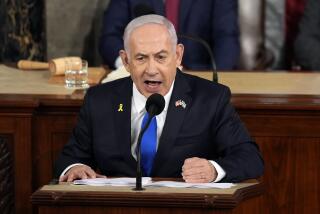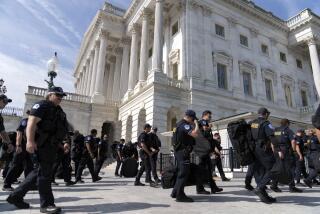Arafat Decries Suicide Bombers but Denounces Israel’s Attacks
- Share via
RAMALLAH, West Bank — Speaking to the largest gathering of Palestinian legislators in two years, Yasser Arafat on Monday condemned terrorist attacks on Israeli civilians while excoriating Israel for attacks on Palestinians.
In a rambling speech delivered at times in a near-whisper, the Palestinian Authority president also promised elections in early January, prompting catcalls from some legislators who demanded that he set the date with an official decree.
Arafat, who appeared weak and at times fumbled with his microphone, apologized early in his 70-minute speech, saying, “I’m sorry, I have a bit of flu.”
In what one Palestinian legislator described as a bid to regain international acceptance, Arafat repeatedly condemned terrorism, “whether it is carried out by state, by group or by individuals.” He expressed sympathy for Americans preparing for the first anniversary of the Sept. 11 attacks, which he called an “unprecedented crime.”
In an apparent reference to suicide bomb attacks by Palestinians that have taken a heavy toll on Israel, Arafat said: “Our national interest and the necessity to maintain international support for our just cause ... force us to reiterate our stand in condemning all these acts of terror against Israeli civilians, but also to condemn every act of terror against Palestinian civilians.”
Israeli leaders were largely dismissive of Arafat’s remarks, saying they want action, not words.
“Arafat’s statement is worthless,” said Tzachi Hanegbi, a leading member of Prime Minister Ariel Sharon’s Likud Party. He called the Palestinian leader “a pathological liar.”
Another Likud member of parliament, Danny Naveh, said Israeli authorities should have prevented the Palestinian Legislative Council from meeting at all.
“It would have been better not to make a move which may breathe new life into Arafat,” he said. “This meeting may reinforce his legitimacy, something which I believe isn’t in our interest.”
Both Sharon and President Bush have said they don’t consider Arafat a trustworthy partner in peace negotiations and have called for new Palestinian leadership. However, Arafat is considered almost certain to win reelection as president of the Palestinian Authority.
Legislators have been pressing Arafat to set a date for elections, both for president and for parliament. Parliamentary elections haven’t been held since 1996.
When Arafat pledged Monday to hold elections in January, several legislators began shouting at him to set a date.
“There’s no decree!” one member yelled.
“I’m saying it in front of you, so there’s a commitment,” Arafat replied.
Several legislators grumbled afterward that Arafat had given them little to work with in attempting to salvage some semblance of self-governance. Many want to see a prime minister appointed to take on the day-to-day running of the government. Arafat opposes such a move, since it would take away much of his power.
“He really should have discussed issues.... We can see that this speech was meant for the world more than for the Palestinian Legislative Council,” said Abbas Zaki, a council member from the West Bank city of Hebron.
Arafat appeared to joke during the speech that he was willing to relinquish power.
“If you want,” he said, “you can bring someone else to replace me in the executive power. I wish you would do it and give me some rest.”
Arafat’s remarks were delivered in a hot, overcrowded meeting room at his headquarters, much of which has been destroyed by Israeli shells. Sandbags partially covered windows, and there were gaping holes in sections of the ceiling.
The meeting drew diplomats from European countries and Canada. The United States did not send a representative.
Legislators last met four months ago but have not met in such numbers since the current round of violence began nearly two years ago. The meeting had the atmosphere of a reunion, since many had not seen one another for months.
“I miss all these friends,” said one attendee, television journalist Nasser Lahem, who said it had taken him 2 1/2 hours to make the 15-mile drive from his home in Bethlehem to Ramallah, traversing military roadblocks and other barriers with a rare Israeli permit.
Of 86 council members, 47 attended the meeting. Twenty-eight tuned in via a shaky videoconference connection from Gaza City. Israel had banned 13 Gaza Strip legislators from attending the session in the West Bank because of alleged ties to terrorism. Others decided to stay in Gaza to show solidarity with the banned members.
About a dozen protesters gathered outside the meeting in Ramallah to chide those who accepted Israeli passes to attend.
“Only Free Men Can Negotiate,” one protester’s sign read.
Relations between Israel and the Palestinians have been relatively calm in recent days, although there was more violence in Gaza on Monday.
Israeli authorities said troops in southern Gaza shot and killed two Palestinian teenagers who were attempting to plant bombs near a fence separating Israel from Gaza. Their families said they were trying to sneak across the border into Israel to find work.
Also Monday, dozens of Israeli tanks and armored vehicles rolled into an area of Gaza where there are four refugee camps, exchanging fire with residents. Soldiers destroyed two buildings near the Bureij refugee camp, including the home of an alleged militant leader believed responsible for a recent attack on an Israeli tank that left one soldier dead.
*
Times staff writer Tracy Wilkinson in Jerusalem contributed to this report.
More to Read
Sign up for Essential California
The most important California stories and recommendations in your inbox every morning.
You may occasionally receive promotional content from the Los Angeles Times.










